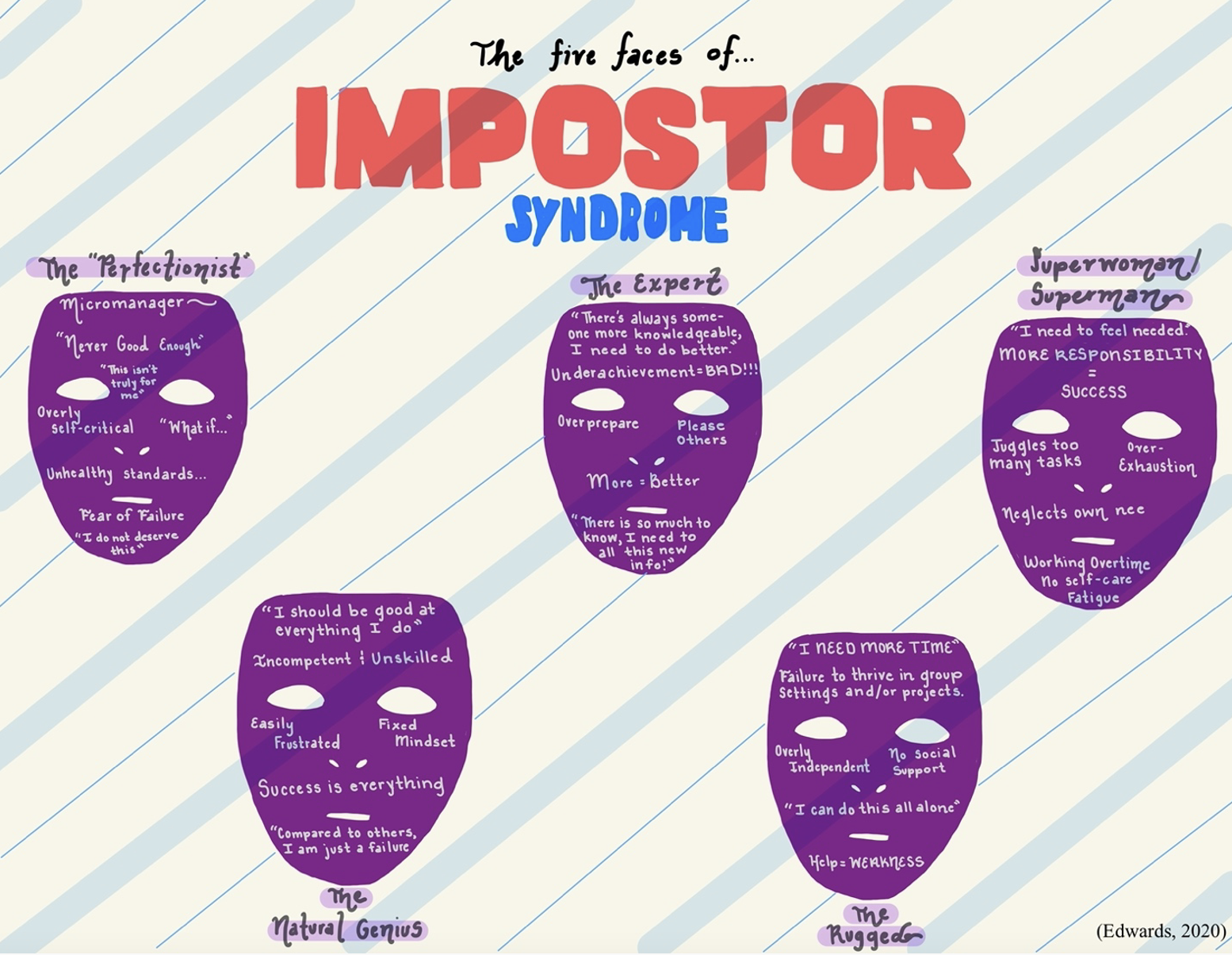Unmasking the Truth about Imposter Syndrome
By Micah Tiamzon
Imposter syndrome has become a popular term that everyone seems to be throwing out, but what exactly does it mean?
This term was first coined by clinical psychologists Pauline Clance and Suzanne Imes to highlight the psychological disturbances that many high-achieving individuals experience (Robinson, 2017). According to Meriam- Webster dictionary (n.d.), imposter syndrome is defined as “a psychological condition… characterized by persistent doubt concerning one’s abilities or accomplishments accompanied by the fear of being exposed as a fraud despite evidence of one’s ongoing success.”
This condition knows no boundaries and is spreading uncontrollably.
The 5 Masks of Imposter Syndrome
Imposter syndrome is an umbrella term that can be divided to other “sub-categories” (Edwards, 2020):
- The Perfectionist: These individuals believe perfection is the reason they are successful. Those who align with this belief fear they are inadequate when they fail to reach their “idea” of perfection when completing tasks or activities.
- The Natural Genius: These individuals believe they must be a “pro” in everything they do the first time around. If they do not achieve this “ranking.” These individuals feel incompetent.
- The Expert: Knowledge is vital to the success of these individuals. Those with this kind of imposter syndrome believe they must be knowledgeable about anything and everything they encounter. If they do not know something, they will feel inadequate.
- The Rugged Individualists: These individuals value independence. Unfortunately, they strive to do everything on their own, avoid group projects, and view assistance or asking for help as a form of inadequacy and incompetency.
- Superwoman/Superman: These group of individuals may sometimes “bit off more than they can chew.” Individuals who align with this category of imposter syndrome may take on multiple tasks and responsibilities to feel successful and accomplished. They may neglect their own needs and wishes and tend to overwork themselves.
Imposter Syndrome and College
The competitive nature of college and higher-education has housed a strong breeding ground for imposter syndrome. Nearly 1 in 5 students will experience imposter syndrome while in college (Harrison, 2022). What does this all mean?
You are not alone.
Imposter Syndrome and My Experience
After completing my first semester of nursing school, I can undoubtedly say, I have dealt with imposter syndrome. I had always viewed by success based on achievements and perfect grades, but nursing school had taught me otherwise.
My perfectionistic nature had definitely been challenged. My “first semester expectations” of straight A’s did not go completely as planned. I felt confused, lonely, and helpless. Part of me wondered if I was truly meant to be part of the nursing program; I even questioned whether I was going to even be a good nurse in the future, since I was not making the grades I envisioned myself to have. It was tough.
But with time, lots of patience, and some pretty wonderful friends, I learned to accept that “perfect” was not realistic. Nursing school is hard, and no one expects you to be perfect. I had to learn to count my successes beyond academics and perfect grades. Progress and improvement is also a sign of success.
How to Combat Imposter Syndrome
While there is no way to determine when imposter syndrome will hit, if it does, just remember:
- You are never alone.
- What you are experiencing is completely normal.
- You do deserve to be where you are.
- You are far worth more than the “inadequacies” you perceive.
And if you are currently going through this:
- Never be afraid to call yourself out. Confrontation and reflection are key to finding the root “cause” of the syndrome.
- Ask yourself, “What is happening that is causing me to feel this way?”
- Talk to friends or family.
- Imposter syndrome is a journey that will allow you to grow.
While this “syndrome” is no easy ride- just keep pushing. You got it.
References
Edwards, V. V. (n.d.). The 5 types of imposter syndrome (and how to overcome it). Science of People. https://www.scienceofpeople.com/impostor-syndrome/
Harrison, M. (2022, March 23). Imposter syndrome is real among college students. Commonwealth Times. https://commonwealthtimes.org/2022/03/23/imposter-syndrome-is-real-among-college-students/#:~:text=That’s%20one%20out%20of%20every,success%20than%20their%20hard%20work.
Merriam-Webster. (n.d.). Impostor syndrome. Merriam-Webster. https://www.merriam-webster.com/dictionary/impostor%20syndrome
Robinson, A. (2017, November). Overcoming imposter syndrome: How to stop feeling like a fraud. Psychopharmacology and Substance Abuse Newsletter. https://www.apadivisions.org/division-28/publications/newsletters/psychopharmacology/2017/11/imposter-syndrome?_ga=2.133225550.1379836328.1670522649-1587675990.1668174808
 Micah is one of our Nine out of Ten Ambassadors and currently is a sophomore at the University of South Florida. She is a nursing major but currently minors in behavioral healthcare. Micah’s interests in integrated care have landed her an internship position at the Sylvia Thomas Center, where she works collaboratively with post-adoptive families and children by connecting them to community resources. While she works to care for others in the community, Micah also is part of her university’s health executive student leadership board. She works collaboratively with other board members from pharmacy, public health, and medicine to identify and advocate for the needs of USF health students. When Micah is not busy studying organ systems or identifying resources, you will find her in the ring or by the water with a book, as she loves to kick-box and read to unwind.
Micah is one of our Nine out of Ten Ambassadors and currently is a sophomore at the University of South Florida. She is a nursing major but currently minors in behavioral healthcare. Micah’s interests in integrated care have landed her an internship position at the Sylvia Thomas Center, where she works collaboratively with post-adoptive families and children by connecting them to community resources. While she works to care for others in the community, Micah also is part of her university’s health executive student leadership board. She works collaboratively with other board members from pharmacy, public health, and medicine to identify and advocate for the needs of USF health students. When Micah is not busy studying organ systems or identifying resources, you will find her in the ring or by the water with a book, as she loves to kick-box and read to unwind.




